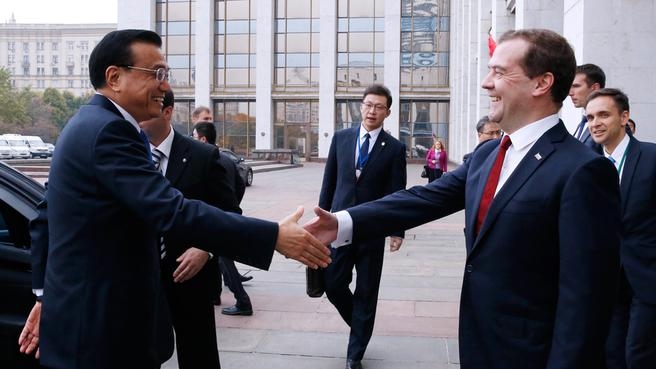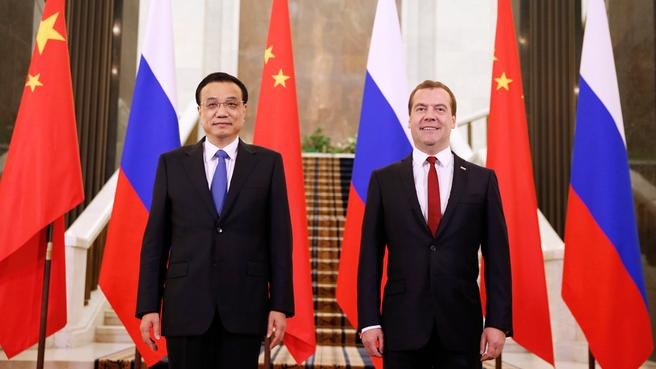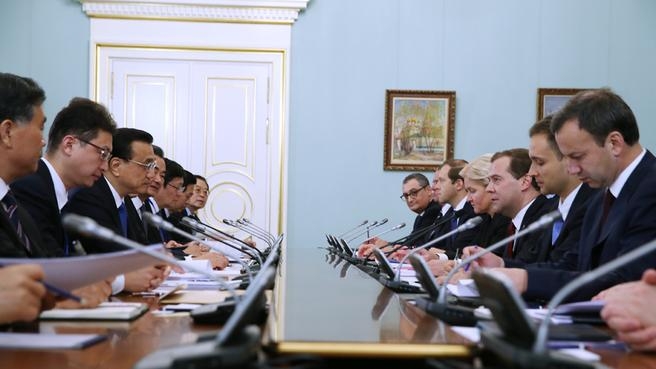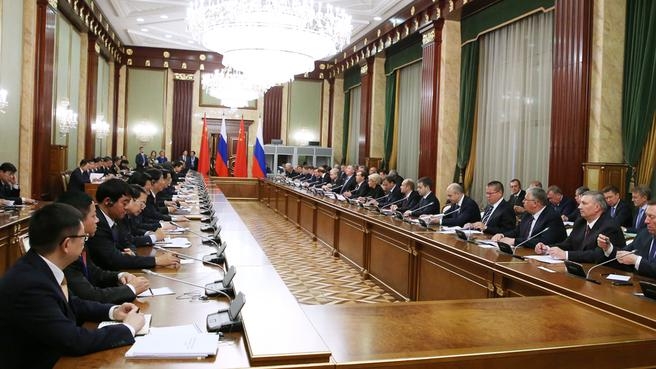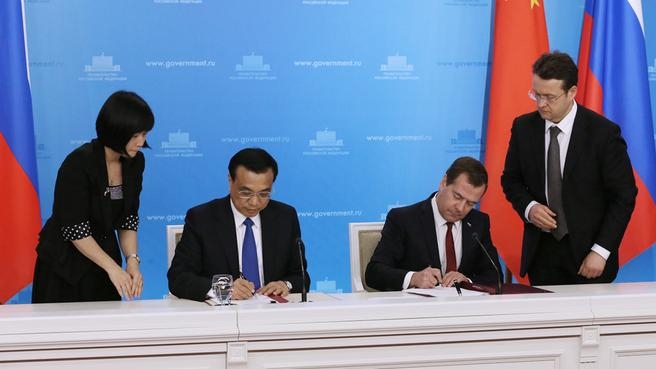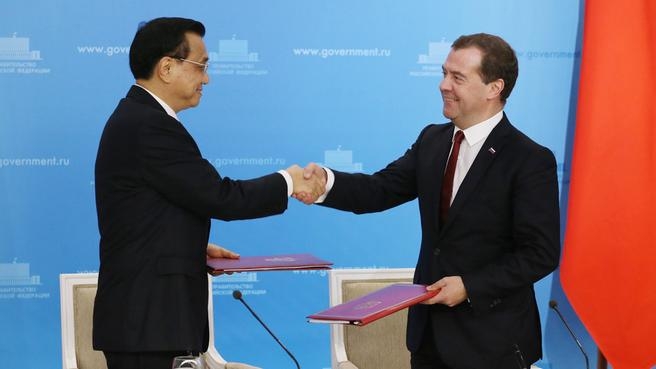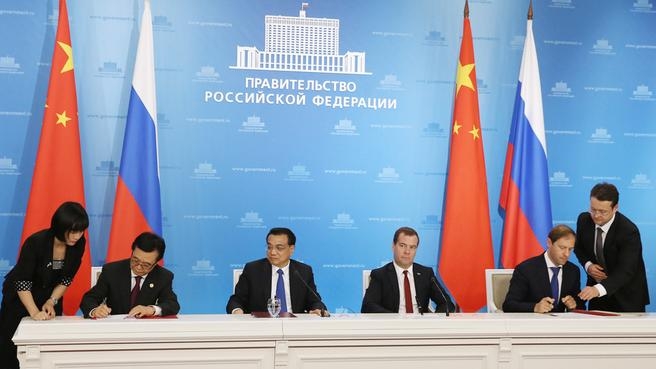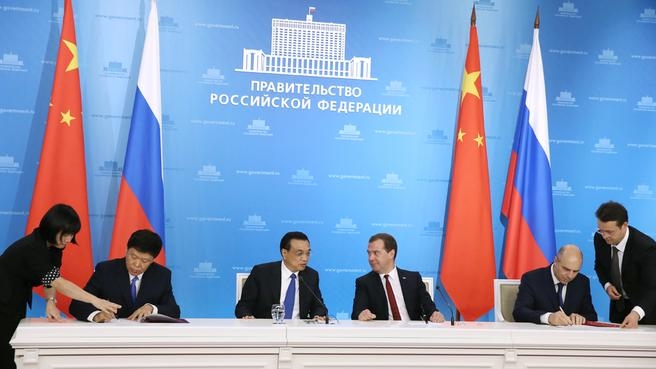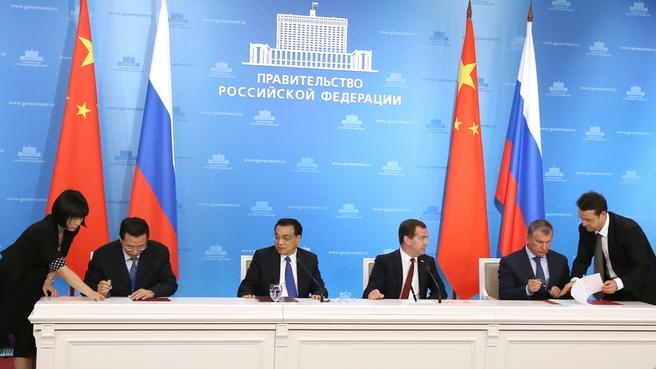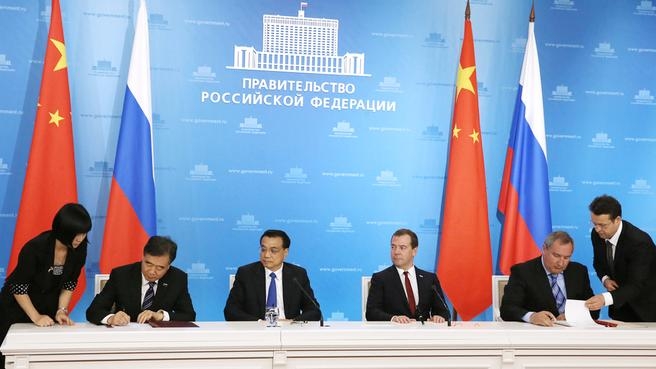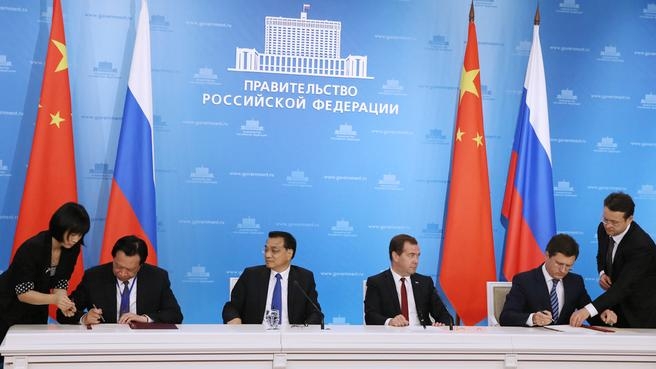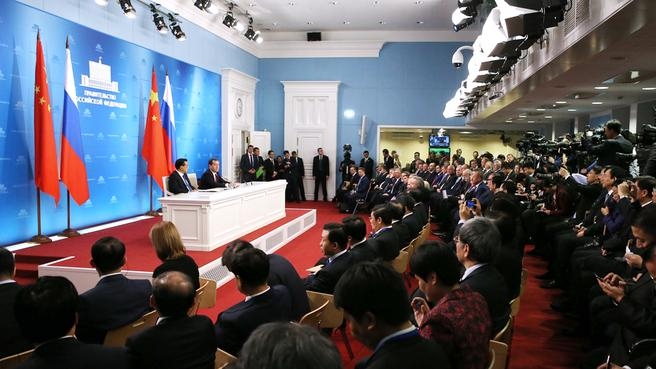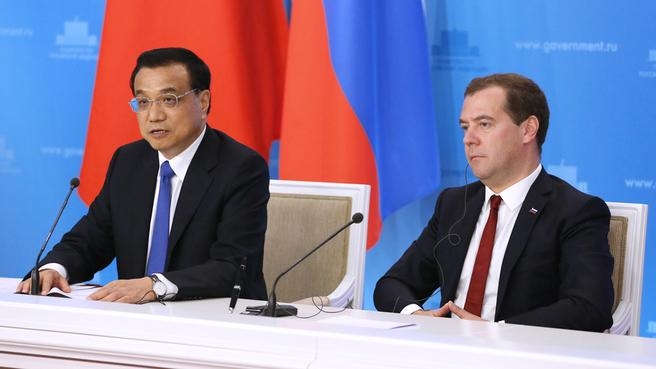During the 19th Regular Meeting of the Heads of Government of Russia and China, Dmitry Medvedev met with Premier of the People’s Republic of China Li Keqiang; a number of documents were signed. Dmitry Medvedev and Li Keqiang also made statements to the media.
Meeting between Dmitry Medvedev and Premier of China Li Keqiang.
Russia-China extended negotiations
Documents signed at the 19th Regular Meeting of the Heads of Government
of Russia and China
Joint news conference by Dmitry Medvedev and Li Keqiang
Meeting between Dmitry Medvedev and Premier of China Li Keqiang
Transcript:
Dmitry Medvedev: Dear colleague, Premier Li Keqiang. First, I’d like to welcome you to Moscow. This is your first visit to Russia as the Premier of the State Council of the People’s Republic of China.
Li Keqiang: Thank you.
Dmitry Medvedev: We are also happy to welcome all the other members of the Chinese delegation. We have a busy programme, and you began working even before the start of the official event – you have met with members of our parliament. Our agenda today includes a big event – the 19th Regular Meeting of the Heads of Government, and tomorrow we will visit the Open Innovations Forum.
I’d like to say that I agree with the high assessment of Russian-Chinese relations, which you provided in your interview with Rossiyskaya Gazeta.
It is true that our relations have risen to a very high level, which we describe as a strategic partnership. Evidence of this was also provided at the previous regular meeting of our heads of government in Beijing in October 2013.
I remember my visit to your birthplace, the town of Hefei in the Anhui Province. It is a nice memory. Thank you again for inviting me there.
Russia and China are very closer partners indeed. China is our largest foreign trade partner. I am not going to give all the figures now, but there is one which I can’t help but mention: Over the past six years, bilateral trade has more than doubled from $40 to $90 billion. But we have more important goals ahead.
Since we have a very busy agenda, I suggest that you take the floor now since we still need to hold the expanded meeting and sign many documents, which were drafted during preparations for your visit – over 40 important bilateral documents.
Li Keqiang (via interpreter): Mr Prime Minister, my dear friend, I’m happy to be able to meet with you today. Thank you for the warm welcome you have given to me and my colleagues. The main issue on my agenda during this visit is to hold the 19th regular meeting of the heads of government of Russia and China. The fact that it will be a 19th meeting is evidence of the endurance, stability and fundamental role of this mechanism for Chinese-Russian relations. We promote the development of Russian-Chinese relations in all spheres.
I’d like to use this occasion to bring compliments to you from my compatriots, from my home province, Anhui, whose residents view you as their big friend. I also promise that my next trip to Russia will begin with St Petersburg, your home town.
<…>
Joint news conference by Dmitry Medvedev and Li Keqiang
Transcript:
Dmitry Medvedev: Premier Li Kegiang, media representatives and colleagues. We have just finished our talks. We concluded them on a very high note: I can tell you that I have never attended a ceremony where so many documents were signed. I hope this reflects the special character of the partnership between Russia and the People’s Republic of China. Together with Mr Li Kegiang, we summed up the results of our work this year and discussed our plans for the future. We signed 38 agreements, and the best thing about them is that their main emphasis is on implementing specific investment projects.
These projects are very diverse. I won’t repeat myself, all the more so since they have just been named. They concern the production of cars, the formation of modern logistics centres and the development of high-tech parks both in Skolkovo in Russia and in the city of Xian in China’s Shaanxi Province. So, these are very good practical results.
It's clear that long-term capital-intensive projects require serious funding. The world’s finances are not in the best shape and far from all countries are developing rapidly. We have difficulties of our own, but nevertheless our major banks have agreed to open lines of credit for joint projects. I think this is also very important for the development of Russian-Chinese cooperation to take place in a predictable manner, and for the funding of all of our projects, both large ones, such as on energy, and smaller ones.
In general, I’d like to point out that our bilateral relations are on the upsurge and China remains our main trade partner despite the general decline in the global economy and the fact that many predictions are not coming true. Moreover, our trade is steadily growing. Even this year it has increased by five percent. This is a good foundation for producing even better results. I will remind you of our prospects: we planned to reach $100 billion by 2015, which I’m absolutely sure we’ll reach, and $200 billion by 2020, which I think is an absolutely feasible task as well. But the main point for us is to use all opportunities and do all we can for upgrading the structure of our trade by substantially increasing the share of high-tech production, which is a catalyst for modern economic development.
We
are carrying out enormous projects, and this is why we have set up a new
intergovernmental commission that will deal with investment cooperation, that
is, promote investment projects in the most diverse areas. I also consider it very
important that despite investment
problems, we are opening up new opportunities. This applies to agriculture and
food production and investment may be mutual. We are interested in attracting
Chinese investment into agrarian projects in Siberia and the Far East. In turn,
as the world’s largest country with the biggest reserves of arable land we can
supply China with food products, especially agricultural products.
We must make broader use of national currencies (today just seven percent of settlements are made in the rouble and yuan.) We’ve made relevant decisions today. I think this will be very useful for developing business.
Our cultural cooperation is also extremely important. We’ve recently organised many brilliant, interesting projects in this sphere and tourism. More and more Chinese nationals want to receive education in Russia. The number of Russians who study in China or learn Chinese is also steadily increasing. There are hundreds of thousands of them and I think this number will be growing. In 2014 and 2015 we have cross years of friendly youth exchanges. They are very important because the younger generations will determine the future of Russia and China and the development of our relations in the next few decades.
My Chinese counterpart Mr Li Keqiang noted recently that our people like to play draughts and chess. Good players are strategic thinkers, but those who think about the future are also good at these games. So we should also think about the future, developing our relations for the years ahead. The more young people from our countries who visit Russia and China under educational or tourist programmes, the better for our bilateral relations.
To sum up, I’d like to sincerely thank our Chinese friends and, of course Premier Li Keqiang for their businesslike, friendly and constructive attitude toward the development of our bilateral relations. I’m confident this will be beneficial for our peoples and the world situation in general. This will make our world a safer and more stable place, and this is exactly what we all need. Xièxiè! (“thank” you in Chinese)
Li Kegiang (via interpreter): Good afternoon, Prime Minster Dmitry Medvedev, journalists, ladies and gentlemen. I’m very pleased for this opportunity to visit Russia. The aim of my visit was to attend the 19th meeting of our prime ministers. This number alone shows that Sino-Russian cooperation is long-term and stable. I’d also like to invite Prime Minister Medvedev to visit China next year. We’ll conduct the 20th meeting of our prime ministers. Mr Medvedev has just summed up the results of our visit and has told you about them in detail.
China
and Russia are major neighbouring countries. We already enjoy comprehensive
partnership and strategic cooperation. The task of our meeting is to give an
official seal to the accords reached and turn them into practical cooperation.
Both our countries are leading growing economies, both are full of determination to develop eternal friendship and to stand together for peace and stability in the region and throughout the world. We are also determined to ensure prosperity and development in the region and in the world. Chinese-Russian cooperation, as Mr Medvedev has just noted, is aimed at mutual benefit and mutual gain. In addition to benefitting both our countries, this cooperation will advance peace, prosperity and stability in the region and development in the whole world. China and Russia are big neighbours. Russia is the world’s largest country in terms of territory and China is the world’s largest country in terms of population. Economic cooperation between us is, to a very large extent, mutually complementary. This year, despite sharp constraints hampering growth in international trade, trade between our countries continued to steadily increase from January through August, which attests to our enormous cooperation potential. You and your companies have a keen and strong desire to cooperate. We hope and are confident that next year the volume of bilateral trade between Russia and China will hit the $100 billion mark. Our cooperation embraces not just trade and the economy, but also the investment sphere, not just the energy sector, but high technologies as well. We should bolster our cooperation in these areas, especially joint development and production cooperation.
Both China and Russia are countries with long histories and brilliant cultures. Humanitarian cooperation is an important pillar supporting the development of bilateral relations. Both sides have decided to boost humanitarian cooperation, particularly through opening joint universities, furthering culture and education and enhancing soft power. Next year, we will hold joint celebrations to commemorate the 70th anniversary of Victory in the Great Patriotic War and the Second World War against Nazism. Our goal is to remember well those difficult years.
As Mr Medvedev has just said, the future belongs to the youth, so we are planning to make the next year a year of friendly youth exchanges. We hope that in holding them, we will plant the seed of friendship deeper in the hearts of our young people and show them the bright future that lies ahead for the development of bilateral relations between China and Russia. Let’s join our efforts in the ceaseless search for new opportunities for Chinese-Russian cooperation. Russia is famous for its matryoshka doll. The matryoshka is very popular in China. It is a very interesting, subtle craft, and it sends a subtle message. I believe that the matryoshka symbolises the huge potential for cooperation between China and Russia. We have just witnessed the signing of agreements, and we don’t even know which document is the last one. Let’s pool our efforts to explore new potential opportunities for cooperation between our countries for the benefit of our peoples and in the interests of our countries’ future and global prosperity. Thank you for your attention.
Question: Interfax. Kseniya Golovanova. I have a question for Mr Medvedev, and would also like to pose it to our Chinese guest. Could you say when an agreement or, perhaps, even a contract, on gas supplies along the so-called “western” route may be signed? What are the timeframes, the volumes and, naturally, the costs?
Dmitry Medvedev: Do you want us to reveal all our secrets? This can’t be done. I won’t hide that today we discussed prospects for our further cooperation, including gas cooperation. We are now very actively developing the “eastern route.” Construction of the Power of Siberia gas pipeline has begun. Nevertheless, we are holding talks with our Chinese partners over the so-called “western” route. I am confident that there are good prospects here, absolutely comparable, say, in terms of volumes, with what can be supplied along the “eastern” route. As for when agreements may be reached, we would like to reach them next year. There is certainly no point in fixing any dates now. At any rate, both we and our partners, our friends from the People’s Republic of China, have stated that we are actively engaged in this negotiation process.
I won’t say anything about commercial terms, because it is forbidden to send any negative or positive signals before agreements are reached. We need to hold all the talks that are necessary in this case. The talks are underway, and this is good.
Li Keqiang: This journalist has just asked me to add a few words to what Prime Minister Medvedev has said. In fact, the Prime Minister gave a fairly explicit account of the current state of the talks. That gas cooperation between Russia and China has existed for quite a long time is open information. The sides are now stepping up efforts to coordinate concrete projects, and the companies involved are holding concrete commercial talks. As for details of these talks, this is up to and needs to be further coordinated between our companies. Thank you.
Question: My question is for Mr Li Keqiang. You have just mentioned that the Chinese and Russian sides will be jointly commemorating the 70th anniversary of the Victory. Could you elaborate on this? What kind of events are going to be held?
Li Keqiang: As you know, both China and Russia were victorious in the Second World War. Our countries sustained heavy casualties in the name of victory and made a solid historical contribution. Next year will mark the 70th anniversary of Victory in the Great Patriotic War and the Second World War. Our goal, as we are preparing to hold these ceremonies, is for history to be remembered, for us to look towards the future and achieve eternal peace throughout the world. We have, on the whole, finalised a plan of festivities, including the participation of the leaders of both countries in each others’ events. We will conduct joint scientific conferences and exhibitions within the framework of the Shanghai Cooperation Organisation, the United Nations and other international organisations. I would like to stress that the aim of these events is to protect the results of the Second World War, protect international justice and the post-war international world order, and propagate a fair ideology of peace throughout the entire international community. We hope that we will live in a harmonious world and that peace will reign eternally.
Dmitry Medvedev: Thank you! Sese! (“thank you” in Chinese).
***
Later that evening, Dmitry Medvedev had an informal meeting with Premier
of China Li Keqiang at the Gorki residence.
